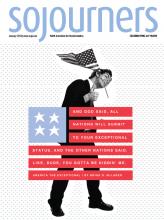Recently I watched “I Came to Testify,” the first program in a PBS series called Women, War, and Peace. The documentary focused on 16 Bosnian women who were brutally raped by Serbian soldiers during the war in the Balkans in the early 1990s. When the U.N. International Criminal Tribunal tried three of the perpetrators of these “crimes against humanity,” these 16 women told their stories.
The three men listened to the women without showing one hint of emotion or regret. All were found guilty of hundreds of counts of rape, but their sentences seem light: 26 years for one, 20 years and 12 years for the others. I traveled twice to Bosnia during that war; I met women like the 16 who testified about the rape camps. I was surprised by the light sentences and disheartened to know that most of the perpetrators will never even be brought to trial.
I cannot hear stories like this without being shocked anew by how often women suffer at the hands of men. But something else struck me as I watched this program. The narrator was a man, actor Matt Damon. “As a man raising four daughters, things like this matter to me,” Damon said. “But it would have mattered anyway … It’s important to understand the experience of women.”
As I listened to Damon, I thought of Nicholas Kristof, co-author of Half the Sky: Turning Oppression into Opportunity for Women Worldwide, a book that compellingly highlights the suffering of women. One chapter focused on rape as a weapon of war in the Republic of Congo, where, according to the American Journal of Public Health, women are victimized at a rate of nearly one every minute. Two years ago in the Congo, I talked and wept and prayed with some of these women. I also talked with local pastors, mentored by a Congolese man named Marcel, who raise money and create care groups to help bring these violated women “back to life”—that’s how the women describe what the pastors and the care groups do for them.
Read the Full Article
